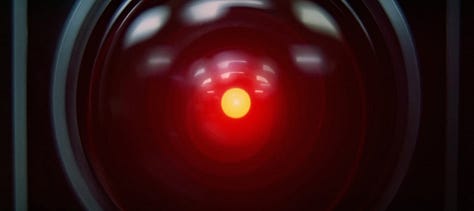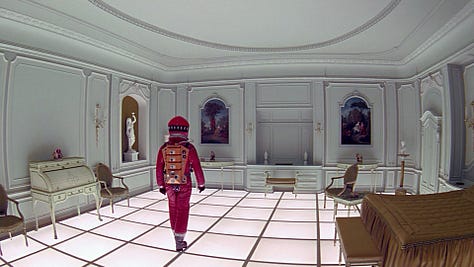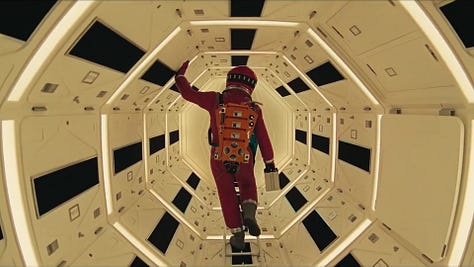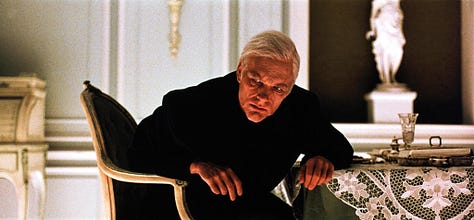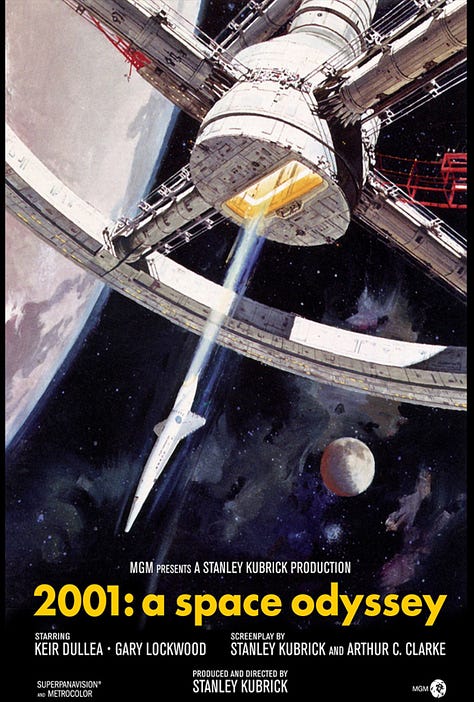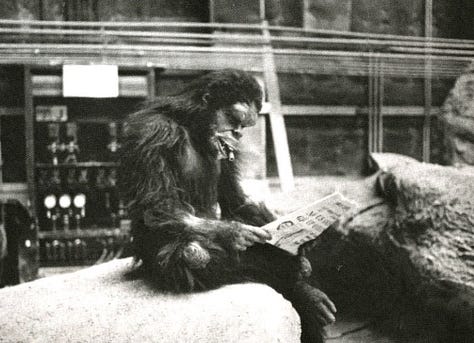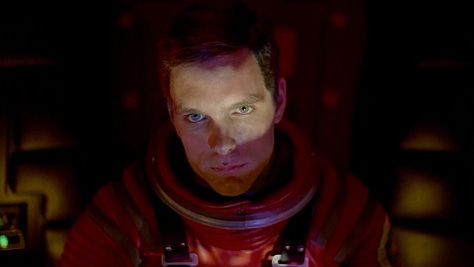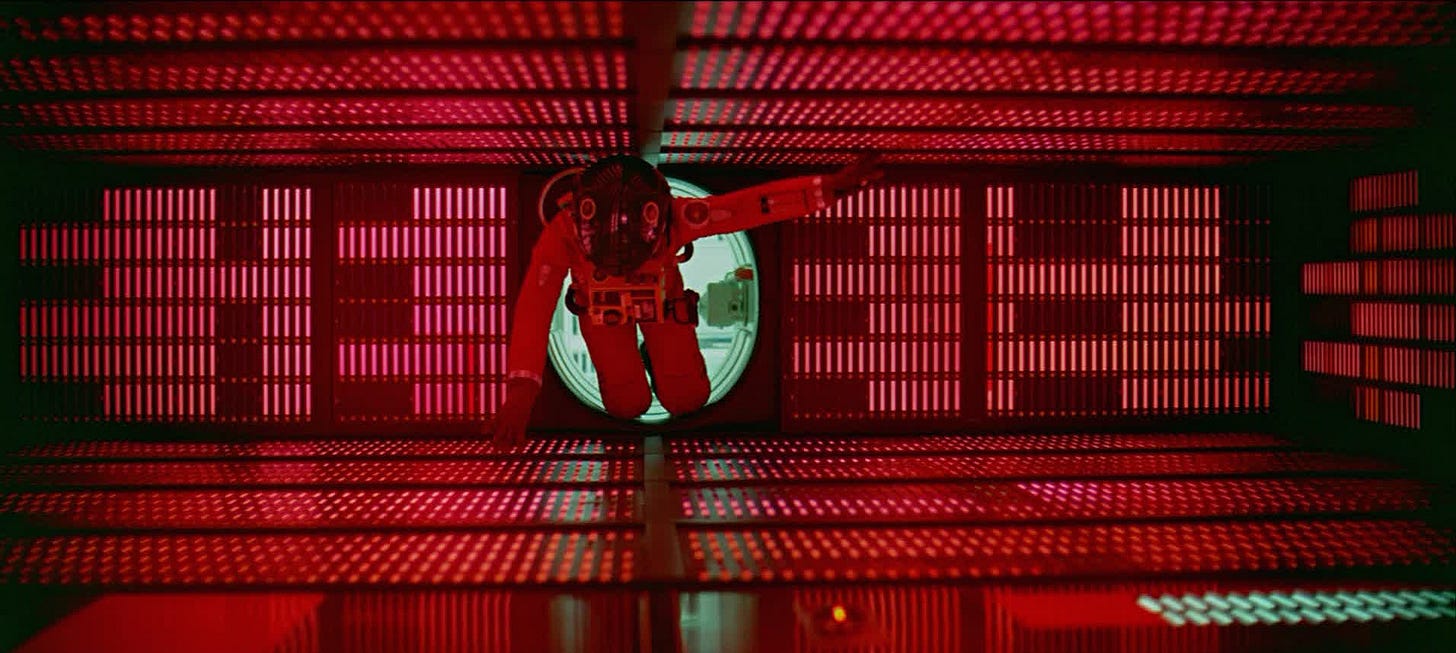2001: A SPACE ODYSSEY
1968 • Stanley KubrickCast: Keir Dullea, Gary Lockwood, William Sylvester, Daniel Richter, Douglas Rain
Screenplay: Stanley Kubrick, Arthur C. Clarke
Cinematography: Geoffrey Unsworth
Metro-Goldwyn-Mayer
I am putting myself to the fullest possible use, which is all I think that any conscious entity can ever hope to do.
2001: A Space Odyssey is one of film’s greatest achievements, an unparalleled exploration of the evolution of humanity and the mysteries of existence. Released in 1968, the film takes its audience on a mesmerizing journey from prehistoric times to the outer reaches of the cosmos, prompting profound questions about our origins, purpose, and destiny.
The film's story unfolds in distinct acts, each contributing to the overarching theme of evolution. The first act thrusts us into the prehistoric era, where early hominids are grappling with the challenges of survival. A mysterious monolith appears before these man-apes, a symbol of extraterrestrial influence. This enigmatic structure triggers a leap in evolution as one of the primitive beings learns to use a tool, marking the birth of technology and the beginning of humanity's ascent.
In a famous match-cut, the film fast-forwards to the year 2001, where mankind has conquered space travel, with space stations hosting hotels and consumer space flights becoming a reality. On the moon, another monolith has surfaced, confounding the United States government. Its origin is traced to Jupiter, prompting a space mission to investigate. This mission is manned by a team of astronauts led by Dave Bowman and Frank Poole, accompanied by the artificial intelligence HAL 9000.
HAL, presented as "foolproof and incapable of error," becomes a central character as the narrative unfolds. The astronauts' perception of HAL's infallibility is shattered when they suspect a critical error in its calculations. In a moment of crisis, Bowman and Poole decide to disconnect HAL. Here, the film raises fundamental questions: Is HAL's programming flawed, or is it merely fulfilling its primary objective?
The ambiguity surrounding HAL mirrors the broader philosophical questions posed by the film. 2001: A Space Odyssey ventures into existential territory, probing into the essence of humanity and its place in the universe. As HAL grapples with the threat of disconnection, the narrative delves into the profound questions that have intrigued humans for centuries. Why are we here? Where are we going? How did we get here? Is there a God? What is happening to Bowman in the final minutes of the film? What are the monoliths?
The film's refusal to provide definitive answers adds to its mystique. Instead of giving the audience answers, Kubrick invites speculation. The final minutes of the film, where Bowman undergoes a surreal transformation, remain open to interpretation. Is this a rebirth, ascension, or a confrontation with a higher intelligence? 2001: A Space Odyssey tells an unconventional narrative. It embraces visual and auditory elements for telling its story. The classical music, particularly Richard Strauss's "Thus Spoke Zarathustra", becomes integral to the film's emotional and intellectual impact.
The film was nominated for 4 Oscars including Best Director and Best Visual Effects (which it won.) It has gained notoriety among most critics lists of top films of all time, appeared in several American Film Institute lists, and was a box office success, especially with roadside engagements and re-releases. It is a film in which you pick up new things with each subsequent viewing. It has influenced science fiction directors like Steven Spielberg, George Lucas, and Ridley Scott and has had a profound impact on the development of special effects in film. There never has and never will be another film like 2001: A Space Odyssey.
- Open the pod bay doors, HAL.
- I'm sorry, Dave. I'm afraid I can't do that.
Notable Awards & Accomplishments
Academy Award Winner: Best Effects, Special Visual Effects
Academy Award Nominee: Best Writing, Story and Screenplay
Academy Award Nominee: Best Director
Streaming: MAX
Digital Rental/Purchase: Available at major digital retailers
Physical Media: Available on 4K, Blu-Ray and DVD
